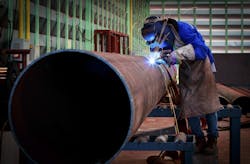Avoiding Porosity During Welding: How to Achieve Effective Gas Purging (.PDF Download)
The production of defect-free welds is crucial if high strength is mandatory. The presence of porosity, in particular, can lead to a significant reduction in mechanical properties.
Joint failure inevitably leads at best to costly repair work but interruption of production can be even more expensive; the worst scenario is injury and loss of life.
Gases such as hydrogen, oxygen, and nitrogen are soluble in many liquid metals. As the metal cools and eventually solidifies, the solubility decreases, and the gas is then released causing porosity. To prevent porosity from forming during fusion welding it is essential that hydrogen, oxygen, and nitrogen are excluded from the welding environment.
This is best achieved by displacing these gases by flushing with an inert gas such as argon which is far less soluble in liquid metal than most other gases. The process is referred to as purging.
